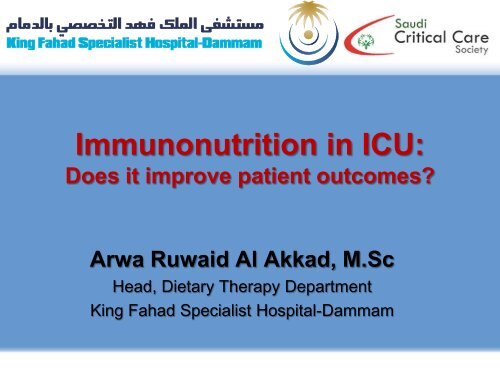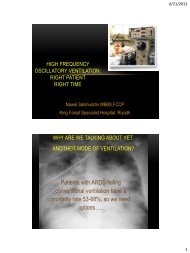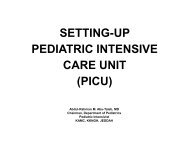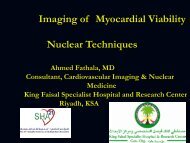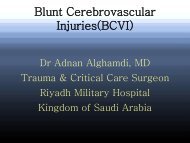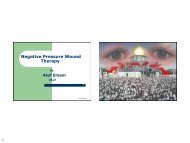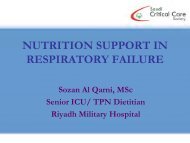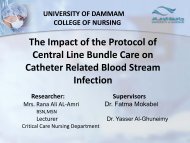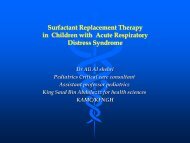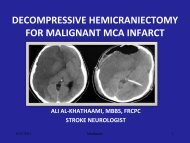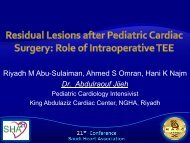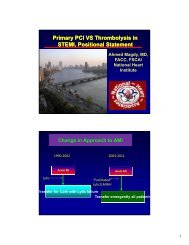Immunonutrition In ICU: Does It Improve Patient ... - RM Solutions
Immunonutrition In ICU: Does It Improve Patient ... - RM Solutions
Immunonutrition In ICU: Does It Improve Patient ... - RM Solutions
Create successful ePaper yourself
Turn your PDF publications into a flip-book with our unique Google optimized e-Paper software.
<strong>Immunonutrition</strong> in <strong>ICU</strong>:<br />
<strong>Does</strong> it improve patient outcomes<br />
Arwa Ruwaid Al Akkad, M.Sc<br />
Head, Dietary Therapy Department<br />
King Fahad Specialist Hospital-Dammam
Immunity in <strong>ICU</strong> pt’s<br />
The widespread recognition that critical<br />
illness is characterized as a state of<br />
immunosuppression and inflammation<br />
has lead to the development of nutritional<br />
support products or interventions designed<br />
to enhance the host immune response<br />
and/or suppress inflammation.<br />
Curr Opin Gastroenterol 2008;24,215-222.
Immunity in <strong>ICU</strong> pt’s<br />
Proceedings of the Nutrition Society 2001; 60, 389-397
<strong>Immunonutrition</strong><br />
Modulation of the activities of the immune<br />
system by nutrients or specific food items<br />
fed in amounts above these normally<br />
encountered in the diet.<br />
Nutr Rev 2003;61(6Pt.1),214–8.
Immunonutrients<br />
• Arginine<br />
• Glutamine<br />
• Nucleotides (RNA)<br />
• ω -3 Fatty Acids (EPA/DHA)<br />
• Branched Chain Amino Acids (BCAA)
Immunonutrients<br />
Proceedings of the Nutrition Society 2001; 60, 389.397
Route of Administration<br />
PO vs<br />
EN vs<br />
PN
Immunonutrients<br />
Immune-Enhancing<br />
Diets (IED’s)<br />
Immuno-Modulating<br />
Diets (IMD’s)<br />
<strong>Improve</strong>d<br />
Clinical<br />
Outcomes
IED’s/IMD’s Outcomes<br />
• Meta-analysis of clinical trials have shown<br />
improvement such as reduced risk of<br />
infection, fewer days on a ventilator, and<br />
reduced length of intensive care unit and<br />
hospital stay.<br />
Proc Nutr Soc 2000;59(4):553–63.
IED’s/IMD’s Outcomes<br />
Pak J Physiol 2010;6(1),50-3
IED’s/IMD’s Outcomes<br />
• <strong>Does</strong> IED’s /IMD’s improve outcomes in<br />
critically ill patients<br />
• Difficult question to answer!!
Deutschman C.S. & Neligan P.J,Evidence Based Practice of Critical Care<br />
2010.<br />
Meta-analysis<br />
<strong>In</strong> analyzing clinical trials, we should pay<br />
attention to four key areas:<br />
(1)Type of immunonutrition.<br />
(2)Timing of initiation of feeds.<br />
(3)Dose of formula and if patients reached<br />
their goals in terms of kilocalories and<br />
protein.<br />
(4)<strong>Patient</strong> population studied.
Enteral formulas<br />
• Impact<br />
• Immune-Aid<br />
• Oxepa<br />
• Perative<br />
• Stressen<br />
• Crucial<br />
• Combination of of one or more<br />
immunonutrients added to standard<br />
enteral formula.
Enteral formulas<br />
<strong>In</strong>tensive Care Med 2008;34,1980–1990
Timing<br />
Early EN<br />
<strong>Improve</strong>d Outcome
Population in <strong>ICU</strong><br />
Surgery<br />
Sepsis<br />
ARDS<br />
Trauma<br />
Burn
IED’s & Trauma<br />
Deutschman C.S. & Neligan P.J,Evidence Based Practice of Critical Care 2010.
IED’s & Surgery<br />
Deutschman C.S. & Neligan P.J,Evidence Based Practice of Critical Care<br />
2010.
IED’s & Surgery
IED’s & Surgery
IED’s & Burns<br />
• Only few studies.<br />
• Burn <strong>ICU</strong> patients supplemented with<br />
Glutamine improved wound healing,<br />
reduced LOS. severely burned patients.<br />
Burns 2005;31,342-346.<br />
• Decreased infection rate.<br />
Crit Care Med 2003;31,2444-2449.
IED’s & other <strong>ICU</strong> pt’s
Meta-analysis
IMD’s & Mortality<br />
• All meta-analysis concluded that IMD’s<br />
generate no overall effect on mortality in<br />
<strong>ICU</strong> patients.<br />
Crit Care Med 1999;27,2799-2805.<br />
JAMA. 2001;286:944-953.<br />
Ann Surg. 1999;229:467-477.<br />
Clin Nutr. 2003;22:221-233.
IMD’s & Mortality<br />
<strong>In</strong>tensive Care Med 2008; 34,1980–1990
Arginine & Sepsis<br />
Arginine supplementation, however, has<br />
been linked to a potentially increased<br />
mortality rate in hemodynamically unstable<br />
septic patients, as compared with standard<br />
enteral formula.<br />
Crit Care Med 1995;23,436–49.<br />
<strong>In</strong>tensive Care Med 2003;29:834–40.
Arginine & Sepsis<br />
High<br />
Arginine<br />
High<br />
NO<br />
↑ vasodilation<br />
HD instability<br />
JAMA 2001;286,944–53.<br />
J Nutr 2007;137(6 Suppl 2),1687S–92S
Arginine & Sepsis<br />
• Other studies have disputed those findings<br />
and, instead, showed a reduced mortality<br />
rate in moderately septic patients.<br />
Crit Care Med 2000;28,643–8.<br />
• The current recommendations are that<br />
IMD’s containing arginine are safe to use in<br />
patients with mild to moderate sepsis, but<br />
that caution should be employed in patients<br />
with more severe sepsis.<br />
JPEN 2009;33,277–316.
Recommendations<br />
JPEN J 2001, 25:S1–S63.
Conclusion<br />
• Move towards complex formula that help in<br />
regulating the immune system in <strong>ICU</strong> pt’s.<br />
• Consider the use of the appropriate IED’s/IMD’s<br />
for each population of <strong>ICU</strong> patient.<br />
• IED’s/IMD’s are effective in surgical patients preand<br />
post operatively, leading in lowering infection<br />
rate & LOS and promote wound healing.<br />
• IED’s/IMD’s provide benefit effect in decreasing<br />
infectious and LOS, especially in trauma pt’s,
Conclusion<br />
• Arginine still it remains unclear whether it is<br />
harmful in septic pt’s.<br />
• Arginine appear to have a limited role in trauma<br />
patients.<br />
• Fish oil (ω-3 fatty acid) without added arginine<br />
reduces mortality, infections and LOS in patients<br />
with sepsis, SIRS and ARDS.<br />
• The role of a high ω-3 fatty acid in trauma patients<br />
has yet to be determined.<br />
• Glutamine supplementation may be beneficial in<br />
burn patients.
Conclusion<br />
• Additional RCTs are required to support and<br />
extend these findings.
Thank You


